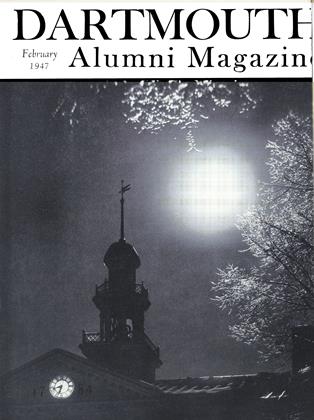JUST AS WOMEN are said to forget quickly the pains of childbirth so do men forget wars. Already Dunkirk is almost a legend, something dimly remembered with the retreat from Mons, or Pickett's charge. So, too, we forget the English when they stood alone against Hitler's victorious hordes in those remote, far off months of 1940. But some of us remember, and if any want to understand now—and we need to understand—what gave the English their calm and indomitable spirit, it is all revealed in a fine book, The Fair Field by John Moore (Simon and Schuster, 1946). By means of a series of descriptions of an English town called Elmbury, a few stories about the inhabitants, a few excellent character sketches, and an artistry born of classical studies in English schools, the author shows us England—unchanged fundamentally since Pistol and Bardolph. They are our people and we should never let them go. This excellent book should be on your shelves not too far away from the story of an English village called Selborne.
It was six years ago, I think, that I wrote in this column about a remarkable book, Kilvert's Diary, written by a curate living in the 19th century in rural England. I read the three volumes, edited by a South African, William Plomer, with great pleasure and I mention it now only to remind you that Macmillan's new catalogue announces the publication of it here. I am glad that at last American readers can enjoy this quiet, unsensational book. It may prove a slight balm to the spirit.
Those of you who enjoyed Mister Roberts will enjoy Basil Heatter's The DimView (Farrar) which is the story of a wounded PT boat officer in Australia. The love scenes leave little to the imagination (a fault of young authors) but they are well done and any who have been to the Pacific and especially to Australia will react favorably, I think, to the minutiae of his descriptions. Reserve officers in the Navy will nod their heads over the author's attitude toward the Annapolis men, and will understand, too, his attitude toward those in uniform who have "never been shot at." The only artificial element in the story is the episode of the Jewish psychiatrist, though it all could have happened. Altogether it is a book you will want to finish at one sitting.
Frank G. Slaughter's In A Dark Garden (Doubleday) is a historical novel dealing with the Civil War and is one of the best I have read for some months. Julian Chisholm, as a surgeon in the Confederate Army, is well drawn, as are the two ladies, slightly melodramatic, of his love life: Jane Anderson and Lucy Sprague. There are many gory descriptions of field surgery which might bother the squeamish reader but they would surely interest surgeons of today. A rousing story which, I think, will keep your interest from the first to the last page. Glasgow, Nassau, and the South come to life as they were some eighty odd years ago. Recommended.
I could not get very excited over Odell and Willard Shepard's Holdfast Gaines (Macmillan) as I found it too episodic, with too many characters, and with too much dialect. It is a noble effort, without doubt, but after one gets interested in a certain character he hears of him no more, and all in all, I was slightly bored.
All Thy Conquests by Alfred Hayes is a brilliantly done picture of contemporary Rome: Rome after defeat and the corruption that gripped that ancient city. There are brutal scenes, but the story of Pollard and his American light of love, of Carla and her American G. I., of Harry and Schultz, and of the studied betrayal by an Italian of his father-in-law will be remembered. This book will illuminate the impersonal news items in the daily press concerning Italy. There is a ring of truth here, albeit it is sensational. I suspect that officers and men who served in Italy after the war ended will find herein much they can personally certify. Howell, Soskin is the publisher.
A writer new to me is Jacland Marmur, whose Andromeda is before me as I write. If the rest of the book is as good as the first 67 pages I am sure I can safely recommend it to you. It is the story of a tramp ship escaping from doomed Singapore. "To Claude Wainwright, Andromeda's engineer, she was not only a symbol of a way of life that was gone forever but to him she was, half in jest, a microcosm of the world, a ship containing every kind of human soul, every sort of potentiality for good or evil." There is a lovely woman on board, so love interest is not lacking. It is most competently written and I want to read more of this Polish American's books.
 View Full Issue
View Full Issue
More From This Issue
-
 Class Notes
Class Notes1918
February 1947 By ERNEST H. EARLEY, DONALD L. BARR -
 Article
ArticleThe American Press
February 1947 By CARL D. GROAT '11 -
 Article
ArticleYour Newspaper and You
February 1947 By CLAUDE A. JAGGER '24 -
 Article
ArticleA Free Press?
February 1947 By A. J. LIEBLING '24 -
 Class Notes
Class Notes1943
February 1947 By FRED F. STOCK WELL, WILLIAM T. MAECK -
 Class Notes
Class Notes1928
February 1947 By OSMUN SKINNER, RUPERT C. THOMPSON JR.
HERBERT F. WEST '22
-
 Article
ArticleHANOVER BROWSING
February 1935 By Herbert F. West '22 -
 Article
ArticleHanover Browsing
February 1939 By HERBERT F. WEST '22 -
 Article
ArticleHanover Browsing
November 1953 By HERBERT F. WEST '22 -
 Article
ArticleHanover Browsing
October 1954 By HERBERT F. WEST '22 -
 Article
ArticleHanover Browsing
March 1957 By HERBERT F. WEST '22 -
 Article
ArticleHanover Browsing
February 1958 By HERBERT F. WEST '22







